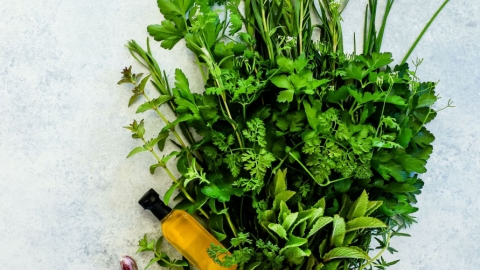Sage Advice For Saving Thyme
Fresh cilantro in salsa, fragrant basil in pesto, soothing and aromatic mint tea; these are just some of the reasons we love fresh herbs. As the warm months dwindle, we can take a few steps to keep enjoying these herbs throughout the year.
The best way to extend the fresh herb season is to use a cold frame, cloche, hoop tunnel or greenhouse to insulate against harsh temperatures. But even with protection, growth will slow as the daylight gets shorter, so plant extra herbs with that in mind. Some herbs will grow on your window sill if you have a sunny south-facing window, and of course, you can use a grow light to keep growing your favourites year round if you have the space.
Top hardy herb choices that can survive most of winter with protection are parsley, thyme, rosemary, lavender, sage, chives, oregano, sorrel, mint and chervil. For less hardy herbs like basil, dill and cilantro your best bet is to preserve them for use later. Here are 10 easy ways to savour your harvest throughout fall and into winter.
1. Keep them fresh.
If you are bringing herbs in from the farmers’ market, they will stay fresh in your fridge for up to two weeks if you treat it like a bouquet. Simply trim the stems and place herb bundles in a glass of water (an inch or two deep). Change the water every few days to ensure freshness and clip the herbs as needed.
2. Dry your herbs.
The two easiest ways to dry herbs are in a dehydrator set to 90–100ºF, or hung in loose bunches in a cool dark place with good airflow. Alternatively, you can spread your herbs out on a tray or plate and use your oven set to its lowest temperature with the door left ajar to let out moisture; you can also microwave them in short increments with the herbs placed between paper towels in a single layer. You can even try a single layer on a tray out in the sun too. Once the herbs are completely dry, crumble them and store in airtight jars or bags. (Be sure they are completely dry before storing or they will mold.)
3. Layer in salt or sugar.
Both work well, but sugar may be more appropriate for herbs you’d like to use for baking or tea. For this method, start with a large glass jar. Layer salt (or sugar), then whole, clean and dry herbs in a single layer, followed by more salt, more herbs, more salt, and more herbs, ending with salt for the top layer. Let this sit in a cool and dry place until the herbs are dried. Pull them out when you want to use them, shaking off excess salt/sugar. Once you’ve used the herbs, the salt will be deliciously infused with their flavour and become a tasty seasoning.
4. Freeze in cubes of water.
Add chopped or whole herbs to ice cube trays, fill halfway with water, then freeze. Once frozen, top off with more water to completely encase the herbs. This will help retain the most possible flavour and prevent oxidation. Herbed ice cubes are perfect to throw in soups and stews and can also work in cocktails and baking.
5. Make a cigar of herbs.
Roll soft, delicate herbs in a tight cigar-like cylinder in a plastic bag. Squeeze out as much air as possible and wrap the roll with an elastic band to keep its shape. Frozen in a tight cylinder shape, you can cut off slices of the herb stick as you need them. Soft herbs that don’t turn brown quickly work well this way. Try dill, cilantro, parsley, sage, tarragon and chervil.
6. Freeze in olive oil.
Leave herbs whole or chop them depending how you best like to use them, pack them in airtight containers or resealable bags and cover them with oil before placing in the freezer. Like the water-packed herbs above, they also work great frozen in ice cube trays. Once frozen you can store all the green ice cubes in a sealed bag or container. Olive oil herb cubes are good for sautéed dishes, pastas, salads and other recipes that you don’t want added water in.
7. Make compound butter (herb butter).
Finely chop or mince herbs and mash together with softened butter, seasoning with salt as desired. Store compound butter in your fridge for up to a week if you used fresh herbs and up to three weeks if you’ve used dried herbs. For longer keeping, form it into a log and wrap tightly, then store in the freezer for three months or longer. When ready to use, you can slice rounds off the end of the frozen butter log and allow it to reach room temperature before using. Excellent on bread and toast, pasta sauce and scrambled eggs.
8. Make an herb paste or pesto.
This is similar to freezing in simple olive oil but in a ready-to-use-blend that keeps really well. I frequently make batches of basil mint pesto when the herbs grow like crazy in the heat of summer. These keep well up to six months. Once packed into airtight containers, add a small skim of olive oil to ensure all herbs are protected from air.
9. Create herbed finishing salt.
Choose a single herb or make your favourite blend. Add herbs to a food processor and blitz until the herbs are fine. Add salt and pulse just once or twice to mix without crushing all the salt crystals. Spread on a tray to dry for a day or so and then store this versatile ingredient near where you cook. Fantastic on simple pan-fried or grilled fish, chicken or veggies, the combinations are endless. This makes a great finishing salt and as such, it’s a great place to use some quality local sea salt—from places such as Salt West in Sooke, Salt Spring Sea Salt on Salt Spring Island and Vancouver Island Sea Salt Co. in Oyster Bay.
10. Make herbal vinegar.
Infuse simple champagne or white wine vinegar with herbs to add subtle yet complex flavour to salad dressings and fresh veggies. Simply place a washed and dried bundle of herbs (rosemary, chives, tarragon, thyme, etc.) into a clean bottle. Fill to within an inch of the top with vinegar, making sure all your herbs are submerged. Top with a secure lid and let sit in a dark place for two to four weeks. Once it is infused, strain the herbs out. Strained well and stored out of direct sunlight, this vinegar will keep indefinitely.





